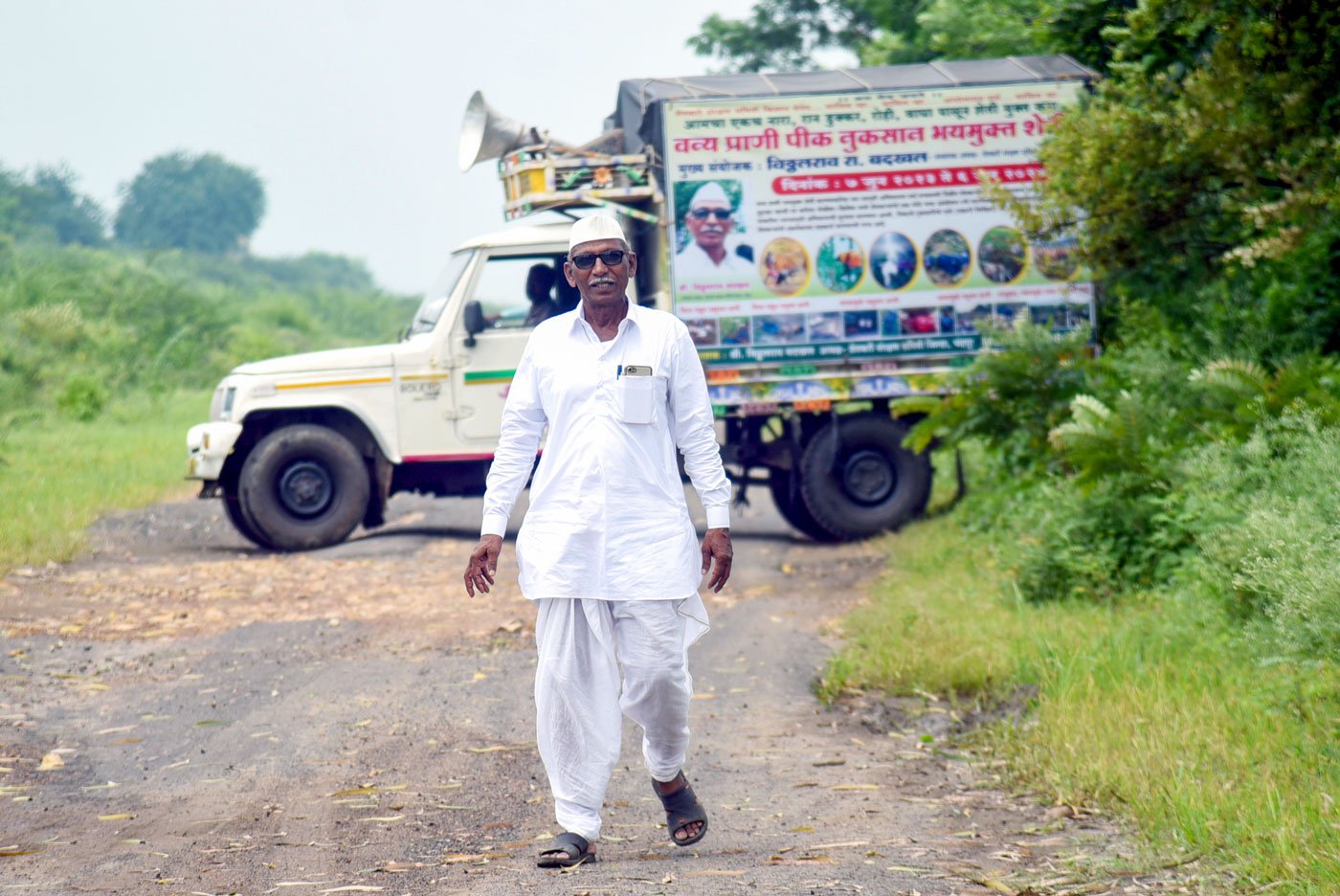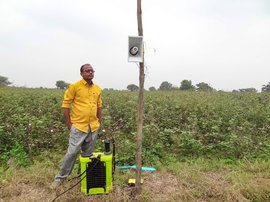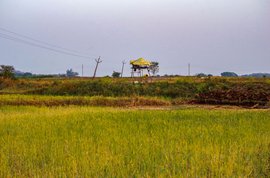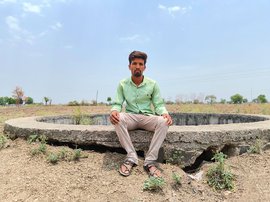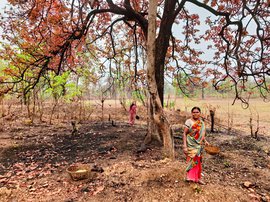The modified Mahindra goods vehicle – MH34AB6880 – comes to a halt at the busy square of a village that lies between the 2920 MW super thermal power station, a barrage of coal washeries, ash dikes and mounds, and the dense shrub forest on the outskirts of Chandrapur.
Pasted on both sides of the vehicle are colourful and attractive posters carrying slogans and photographs. It immediately draws the attention of the village on a lazy Sunday morning in early October 2023; children, men and women rush to see who has arrived.
Vitthal Badkhal steps out of the vehicle – a driver and a helper by his side. The septuagenarian holds a microphone in his right hand and a brown diary in his left. Clad in a white dhoti, a white kurta, and a white Nehru cap, he starts talking into the mike, relayed on a loudspeaker mounted on the vehicle’s front door.
He explains the reason he is here. His voice rings through the nooks and corners of this 5,000-people village where most people are farmers, and others do daily wage work in the nearby coal units or small industries. The speech lasts five minutes and as it ends, two veteran villagers welcome him with a smile:
“ Arre mama, namskar, ya basa [Hello uncle, greetings! Please come, sit],” remarks Hemraj Mahadev Diwase, a 65-year-old farmer who runs a small grocery shop in the main square of the village.
“
Namaskar
ji
,” Badhkal
mama
replies with
folded hands.

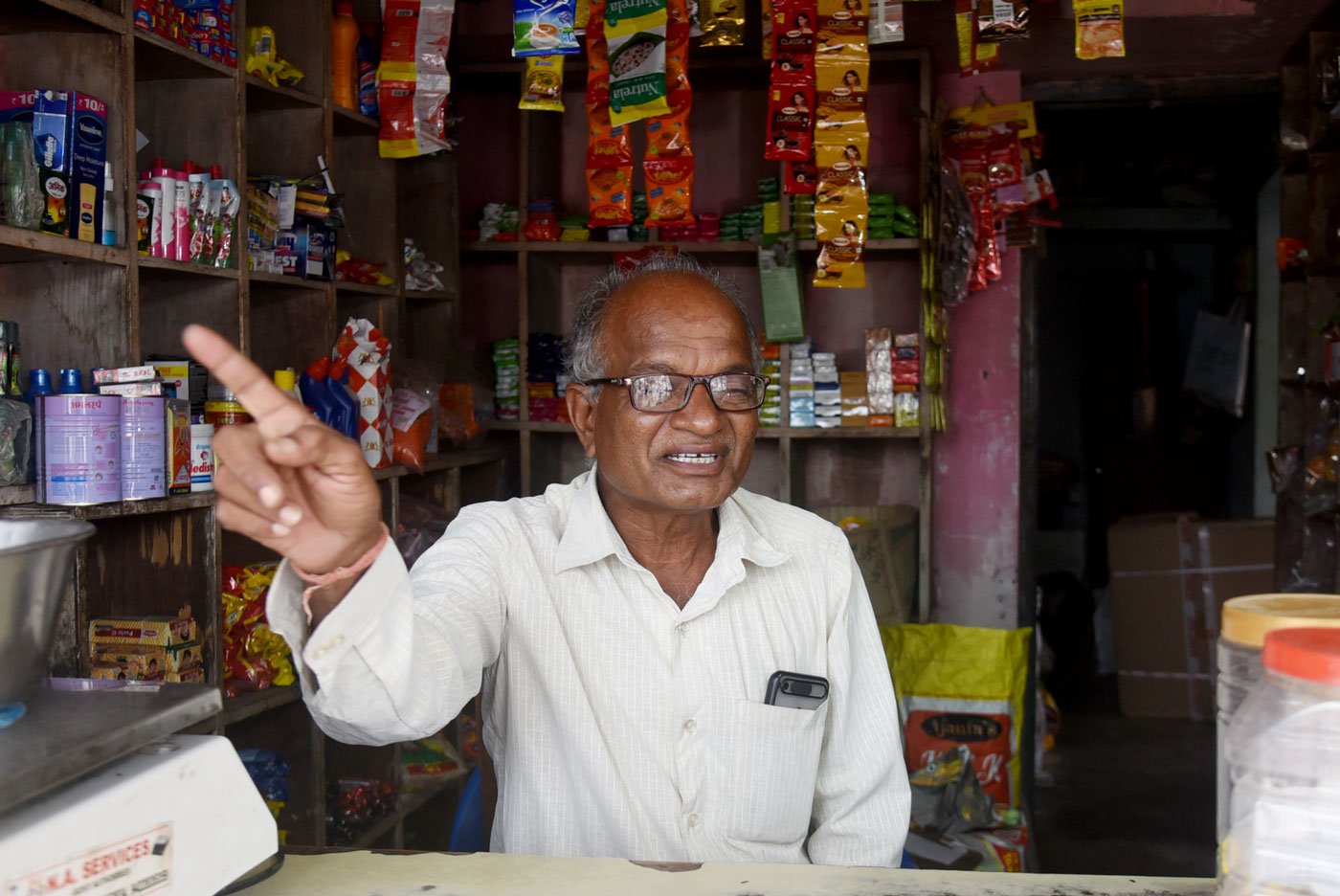
Left: Vitthal Badkhal on a campaign trail in Chandrapur in October 2023. He is fondly known as ‘Dukkarwale mama ’ – ran-dukkar in Marathi means wild-boar. He has started a relentless crusade against the widespread menace on farms of wild animals, particularly wild boars. His mission is to make the government acknowledge the problem, compensate and resolve it. Right: Hemraj Mahadev Diwase is a farmer who also runs a grocery shop in Tadali village. He says the menace of the wild animals on farms in the area is causing losses
Surrounded by villagers, he quietly walks towards the grocery shop and settles in a plastic chair, facing the village square, his back to the shop where the host, Diwase sits in anticipation.
Wiping the sweat on his face with a soft white cotton towel, ‘ mama ’, as he is respectfully called here, directs people to sit or stand around and listen to his appeal – or what will really be a 20-minute workshop.
What follows is a step-by-step guide on how farmers can claim compensation against crop losses in their fields due to wild animal raids, rising cases of snake bites, and human deaths in tiger attacks. The tedious and cumbersome procedure is simplified and explained to the beleaguered villagers; he also touches upon preventive measures to be taken in monsoon while working in the farms to duck a lightning strike.
“We are troubled by wild animals, tigers, snakes, lightning – how do we make ourselves heard by the government?” Badkhal goes on in chaste Marathi, his forceful tone keeping his audience glued. “Unless we knock on its doors how will the government wake up?”
To answer his own question, he travels through the villages around Chandrapur to raise awareness and explain to the farmers how to claim compensation against crop losses due to wild animal raids.
A farmers’ rally will soon be held in Bhadravati
town, he informs them. “You all must be there,” he urges the villagers, before
embarking in his vehicle for the next village.
*****
Young students call him ‘Guruji’, meaning teacher. His supporters call him ‘ mam a’ (maternal uncle). Among his own tribe of farmers, Vitthal Badkhal is fondly known as ‘Dukkarwale mama ’ – ran-dukkar in Marathi means wild-boar – for his relentless crusade against the widespread menace of wild animals, particularly wild boars, on agriculture fields. His mission is to make the government acknowledge the problem, compensate and resolve it.


Left: Women farmers from Tadali village speak about their fear while working on farms which are frequented by wild animals including tigers. Right: Vitthal Badkhal listens intently to farmers
Badkhal has been a one-man voluntary mission, mobilising farmers to seek compensation for the crop damages, educating them on how to file the claims in keeping with the tedious procedures – from spot inspection to form submissions.
His turf: The whole of Chandrapur district, around the Tadoba Andhari Tiger Reserve (TATR).
There are many claimants for drawing the government’s attention to this issue. But it is largely due to this man’s movement that the Maharashtra government first acknowledged the problem; it passed a resolution in 2003 approving cash compensation to farmers for crop losses due to wild animal raids that people liken to “a new kind of drought.” That, Badkhal says, was five-six years after he had begun to educate and mobilise farmers, and stage frequent protests.
In 1996, when coal and iron ore mines proliferated around Bhadravati, he lost his entire farmland to an open cast mine opened up by the Western Coalfields Limited (WCL), a subsidiary of the public sector, Coal India Limited. Telwasa-Dhorwasa, the twin villages from where Badkhal hails, lost land to the mines.
By then, the wild animal raids on farms had become alarming. A gradual change over two or three decades in the quality of forests, an explosion of new mining projects all over the district and expansion of thermal power plants have cumulatively led to the aggravation of the wild-animal and human conflict, he says.
With his wife Mandatai, Badkhal shifted to Bhadravati around the year 2002 and took a plunge as a full-time social worker. He is also an anti-addiction and anti-corruption crusader. His two sons and a daughter are all married and live a rather low-profile life in contrast to their father.
For his own living,
mama
has a small farm processing venture – he sells chilly and
turmeric powder, organic jaggery, and spices.

Badkhal with farmers in the TATR. He says, gradual changes over two or three decades in the quality of forests, an explosion of new mining projects all over the district and expansion of thermal power plants have cumulatively led to the aggravation of the wild-animal and human conflict
Over the years, an indomitable mama has rallied the farmers from around the Chandrapur and neighbouring districts to increase the government’s budgetary outlay for compensation against wide-spread crop damages by herbivores, and cattle, as well as human fatalities in carnivore attacks.
When the first government resolution was issued in 2003, compensation was merely a few hundred rupees – now it is Rs. 25,000 per hectare for a maximum of two hectares of land in a year for one household. It’s not adequate, but given that the state government has increased the compensation amount is itself an acknowledgement of the problem, says Badkhal mama . “Problem is that not many farmers across the state file the claims,” he says. Today, his demand is to enhance that compensation to Rs. 70,000 per year, per hectare, per household as “it will be an adequate compensation.”
In Maharashtra, the forest department annually budgets Rs. 80-100 crore towards compensation for cattle kills, crop losses, and human deaths in the attacks of large carnivores, the then Principal Chief Conservator of Forests (Head of Forest Force) Sunil Limaye had told PARI in March 2022, during a freewheeling conversation.
“That’s a pittance,” says mama . ““Bhadrawati [his home tehsil ] alone gets Rs 2 crore in compensation annually as a consequence of more farmers in that tehsil applying for it because they are aware and better trained than the others,” he says. “Elsewhere,” he adds, “the issue does not have traction.”
“I’ve been doing it for 25 years,” the man with a rustic sense of humour and tone says at his home in Bhadravati town in Chandrapur district. “I will do it for the rest of my life.”
Today, Badkhal
mama
is in demand all over Maharashtra.
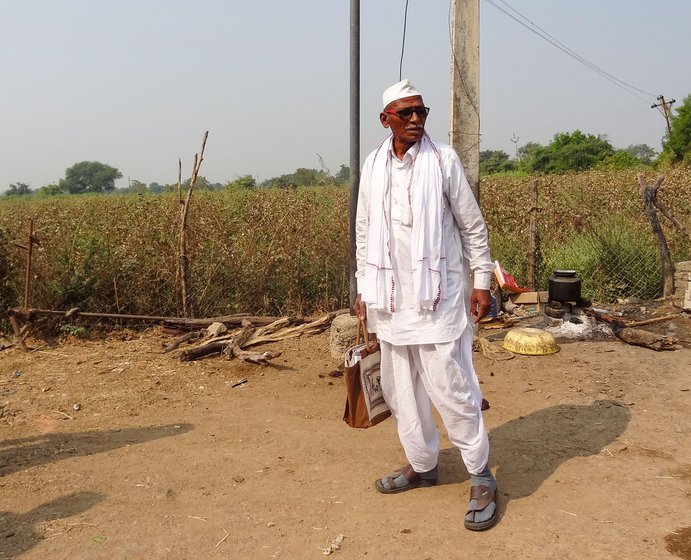
Badkhal mama is in demand all over Maharashtra. 'I’ve been doing it for 25 years... I will do it for the rest of my life,' says the crusader from Bhadravati town in Chandrapur district
The Maharashtra government has increased the compensation amount. This is an acknowledgment of the problem, says Badkhal. But, not many farmers across the state file the claims. He is demanding enhancement of the compensation
*****
On a cold and windy day in February 2023, PARI joins him on his usual round of nearby villages in Bhadravati tehsil , west of TATR. Most farmers are harvesting the rabi crop.
A trip to four or five villages shows the desperation among the harassed peasants of all castes and varied land holdings, bound by the single headache of marauding wild animals.
“See this,” one farmer standing in the middle of his green gram planting says. “What is left for me of this?” This field was devoured the previous night by wild boars. Last night, the farmer says despairingly, they ate the crop in this part. Tonight, they will come again by night, and finish whatever is left of this farm. “What do I do, mama ?” he asks, worried.
As Badkhal gauges the losses on the farm, he
shakes his head in disbelief and responds: “I will send a person with a camera;
let him take photographs and videos, and he’ll have you fill up and sign an
application form; we need to submit a claim with the local range forest
officer.”

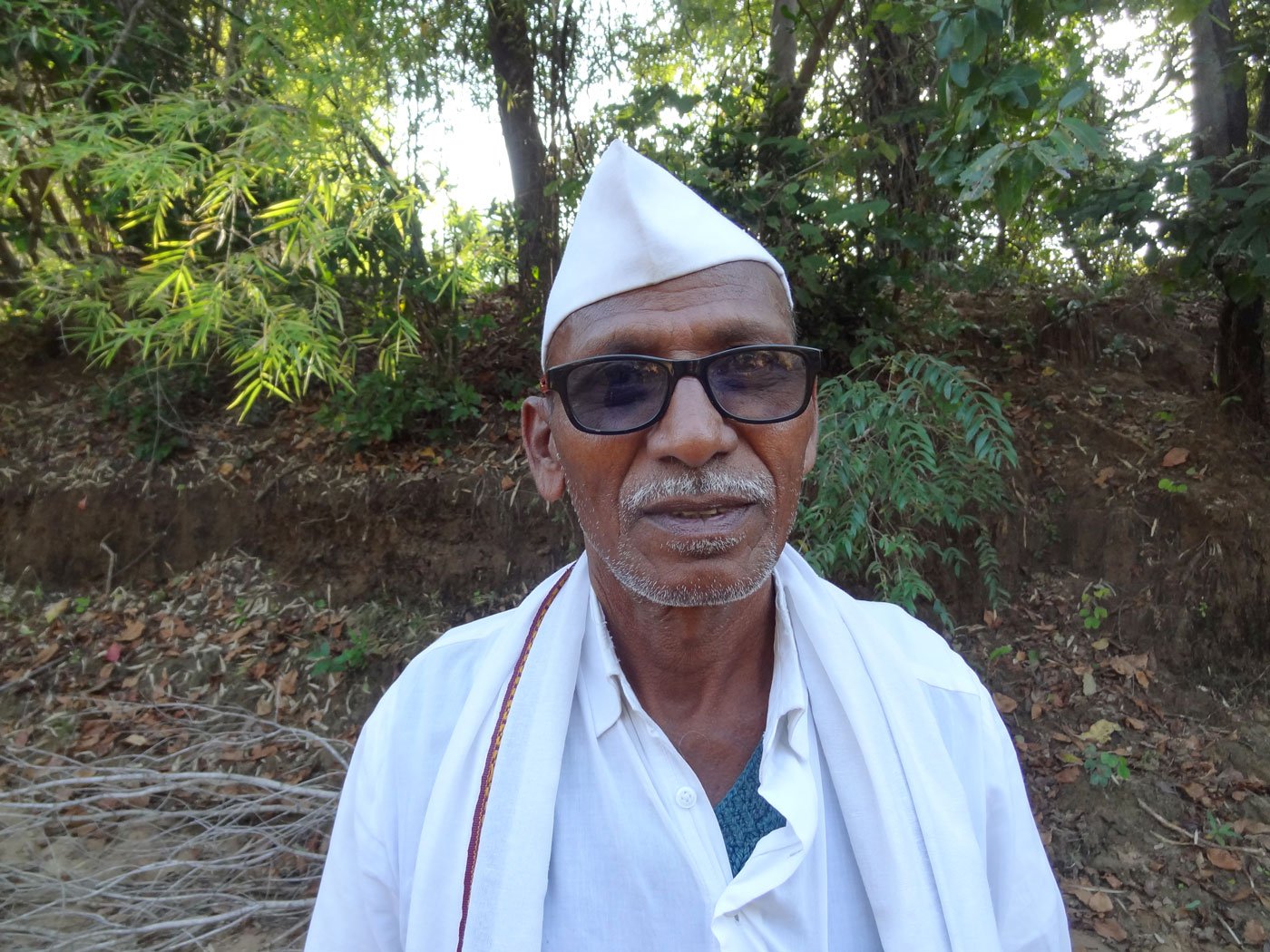
Left: Manjula helps farmers with the paperwork necessary to file claims. Through the year, and mostly during winters, she travels on her Scooty (gearless bike) from her village Gaurala covering about 150 villages to help farmers with documentation to apply for and claim compensation. Right: Vitthal Badkhal visiting a farm
The person who comes to do this is 35-year-old Manjula Badkhal, a landless woman in Gaurala village. She runs a micro cloth enterprise and doubles up with this professional service to farmers.
Round the year, and mostly during the winter, she travels on her Scooty (gearless bike) covering about 150 villages to help farmers with documentation to apply for and claim compensation.
“I take photos, fill up their forms, do the affidavits if necessary and take consent of members of a family who have a share in the farm,” Manjula tells PARI.
How many farmers in a year is that?
“Even if you take 10 farmers in a village,” she says, “that’s about 1,500.” She charges Rs. 300 per farmer for the work she does – Rs. 200 of which cover her travel, photocopying and miscellaneous costs. She earns Rs. 100 for her labour, and any farmer is more than happy to pay that much, she adds.

The 72-year-old activist resting at Gopal Bonde’s home in Chiprala, talking to him (left) and his family about filing claims
Meanwhile, mama is continuing with his advice to the farmer: He tells him to wait for a team of officials to come do their panchanama , or spot inspection, to verify the farmer’s claim. A talathi , a forest guard, and agriculture assistant will come and inspect the farm, he says. “ Talathi will measure the size of land; the agriculture assistant will note down the crops that have been eaten; and the forest man will know which wild animal damaged your crop,” he explains. This is the rule, he adds.
“You’ll get your dues; if you don’t, we will fight for it,” Badkhal assures him in a fiery tone that not only lifts the farmer’s mood but also brings him much-needed solace and moral support.
“What if the officials don’t come to do the spot inspection?” the farmer asks worriedly.
Badhkal explains patiently: the claim needs to be filed within 48 hours of the incident, following which the complaint must be submitted, and the team must visit your farm within seven days, and submit a report within 10 days of their inspection. The farmer must get compensation within 30 days, he declares.
“If they don’t come within 30 days of your application then the rule says our spot inspection and photographs would have to be accepted by the department as proof,” Badkhal explains to him.
“ Mama, mayi bhist tumchyavar hay [See mama , my fate is in your hands],” pleads the farmer, with folded hands. Mama pats him on his shoulders and consoles him: “Don’t you worry.”
His team, he says, will do it once; from here on
he (the farmer) must learn to do it by himself.

Vitthal Badkhal inspecting the farm of one of his close volunteers, Gopal Bonde in Chiprala village of Bhadravati tehsil , close to the buffer area of the TATR. The farm is set for rabi or winter crop, and already wild animals have announced their arrival on his farm
Unlike these personal spot visits, Mama holds impromptu workshops while on the campaign; he distributes the templates of compensation claim forms to villagers.
“Read my pamphlet carefully,” he tells the villagers in Tadali during his campaign in October 2023, as he distributes the hand bills to the gathered villagers
“Ask me now, if there’s any confusion, and I shall clarify.” His forms are easy to read templates in Marathi. It has columns to include personal details, land size, cropping pattern etc.
“Along with this form, you need to attach copies of your 7/12 extract [saat-bara land records], Aadhaar card, bank details, and photos of the farm clearly showing crops eaten by wild animals,” Badkhal says. “You must submit the complaint-cum-claim without any error – and if you need to do it several times in a season, so be it,” he insists. “There is no gain without pain,” he quips.
It takes up to a year for the government to
release the money, when the law says it must be deposited within 30 days.
“Earlier forest officials used to demand bribes to do this work,” he says, “now
we insist on direct bank transfers.”

Badkhal at his home in Bhadravati tehsil of Chandrapur district
Since any large-scale preventive measures are neither plausible nor possible in the wild animal raids on farms, the only available measure to mitigate the loss is to compensate a farmer. The process of counting farm losses and filing compensation claims in lieu of the laid down statutory procedural guideline is a cumbersome procedure, designed to put most off.
But Badkhal says, “if we have got to do it, we have got to do it.” And he believes that for that the best way is to shun ignorance and arm the people with knowledge and rules.
Mama’s phone never stops ringing. There are people from all over Vidarbha calling him for help. Sometimes he gets calls from other parts of Maharashtra, even other states, he says.
Problems abound in gauging the actual loss, for sometimes the inspection does not yield the true picture. For instance, “how do you measure the loss if wild animals eat the cotton-bolls or soybeans but leave the plants in good shape?” Forest officials come for inspection, see the green plants standing, and return to their offices to report that there’s no loss, when in fact a farmer has suffered a huge loss.
“The compensation rules require amendment in the
famers’ favour,” Badkhal demands.
*****
From February 2022, this reporter joined Badkhal on several of his visits to villages in the dusty heartland around the TATR forests.
His typical day during the campaign, funded by generous donors, farmers, and his well-wishers, starts at 7 a.m. and ends at 7 p.m. and he covers 5 to 10 villages a day.

Alongwith Badkhal on the campaign trail is a Mahindra vehicle in which he travels to the villages
Every year, Badkhal prints 5,000 special calendars in Marathi with information on back pages about government resolutions, schemes, crop compensation procedures and things that farmers can easily refer to – this, from the money raised in donations. His team of farmer-volunteers use social media for dissemination of information and exchange of thoughts.
About a decade ago, he set up the ‘Shetkari Samrakshan Samiti’ (Committee for the Protection of Farmers) to steer the movement in and around the Chandrapur district; it now has roughly 100 volunteers from among the farmers, who help him.
You’ll find the compensation claim forms, in a standardised template, along with the templates of the other statutory documents, kept with the Krishi Kendras, or the agri-input shops all over the district. Every farmer comes to the Krishi Kendra and the Krishi Kendras live off the farmers, so the movement takes their help in spreading the word, and they willingly do it.
Badkhal gets distress calls from anxious farmers throughout the day. Sometimes, it’s a cry for help. Sometimes, it’s an angry remark. Often, the calls are to seek his counsel.
“There are farmers. There is wildlife. There are farmers’ leaders. There are wildlife enthusiasts. And then there’s the government – the forest, agriculture and revenue officials, trying to do the firefighting, postpone this problem forever.” Badkhal goes on. “No one has a solution.”


Left: Pamphlets and handbills that Badkhal prints for distribution among farmers. He is showing (right) calendars that he prints to raise awareness and educate farmers about the procedure to claim compensation
The best one can do, he says, is to get the compensation, because that’s the only relief available.
And so, mama goes around travelling in his carriage, on a bus, or with someone on a bike, visiting villages, meeting farmers, trying to convince them to mobilise for struggle.
“As resources become available,” he says, “I plan my village visits.”
This campaign ran from July through October 2023, and covered about 1,000 villages in the Chandrapur district alone.
“Even if five farmers in every village submit a compensation claim to the forest department, this campaign would have accomplished its objective,” he says.
Getting farmers to come together for their own
interests is difficult, Badkhal says. The tendency is to cry, not fight back.
Crying is easy, he says, as is blaming the government. But fighting for rights,
demanding justice, and burying our own differences for a common cause is
difficult.


'Even if five farmers in every village submit a compensation claim to the forest department, this campaign would have accomplished its objective,' he says
A band of conservationists, animal enthusiasts, experts, and tiger lovers are doggedly pursuing wildlife interests in and around the TATR, but their approach is without regard for the communities’ multidimensional concerns and problems which are intensifying, Badkhal laments.
His movement provides the only counterpoint – and in two decades he has created a space for the voice of farmers.
“Our views may not be liked by those working for wildlife conservation,” Badkhal insists, “but it’s important to understand that local communities confront life-and-death issues.”
And on their farms, they do it every day, every year.